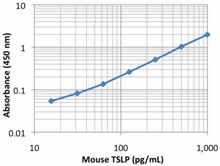- Regulatory Status
- RUO
- Other Names
- TSLP Pre-coated ELISA Kit
- Ave. Rating
- Submit a Review
- Product Citations
- publications

Thymic stromal lymphopoietin, also known as TSLP, is a hemopoietic cytokine originally identified as a product of a thymic stromal cell line (Z210R.1). Mouse TSLP is a 24 kD, monomeric glycoprotein which belongs to the IL-7 family of cytokines. TSLP is produced mainly by non-hematopoietic cells such as fibroblasts, epithelial cells and stromal or stromal-like cells. In mice, TSLP is reported to impact B cell maturation at different stages in vitro. TSLP is also involved in expanding the CD4+ subset of lymphocytes and thymocytes and thus regulate CD4+ cell homeostasis. In humans, TSLP mainly impacts myeloid cells and induces the release of T cell-attracting chemokines from monocytes and enhances the maturation of CD11c+ dendritic cells. TSLP activated dendritic cells prime naïve T cells into a Th2 phenotype, which are strong producers of cytokines IL-13, IL-5, and TNF-a. TSLP also stimulates the production of Th2 cytokines by human mast cells. Therefore, TSLP acts on multiple targets and has broad roles in the regulation of inflammatory and allergic processes.
BioLegend’s LEGEND MAX™ Mouse TSLP ELISA Kit is a sandwich Enzyme-Linked Immunosorbent Assay (ELISA), in which, a Mouse TSLP specific monoclonal antibody is pre-coated on a 96-well strip-well plate.
BioLegend’s LEGEND MAX™ Mouse TSLP ELISA Kit is specifically designed for the accurate quantitation of Mouse TSLP from cell culture supernatant, serum, plasma or other bodily fluids. It is ready-to-use, accurate, and sensitive.
Kit Contents
- Kit Contents
-
- Anti-Mouse TSLP Pre-coated 96-well Strip Microplate
- Mouse TSLP Dectection Antibody
- Mouse TSLP Standard
- Avidin-HRP A
- Assay Buffer A
- Wash Buffer (20X)
- Substrate Solution F
- Stop Solution
- Plate Sealers
Product Details
- Verified Reactivity
- Mouse
- Application
-
ELISA
- Product Citations
-
- Sensitivity
- 4.3 pg/mL
- Standard Range
- 15.6-1,000 pg/mL
- Materials Not Included
-
- Microplate reader able to measure absorbance at 450 nm
- Adjustable pipettes to measure volumes ranging from 1 µL to 1,000 µL
- Deionized water
- Wash bottle or automated microplate washer
- Log-Log graph paper or software for data analysis
- Tubes to prepare standard dilutions
- Timer
- Plate Shaker
- Polypropylene vials
Antigen Details
- Cell Sources
- Myeloid cells and induces the release of T cell-attracting chemokines from monocytes
- Biology Area
- Immunology
- Molecular Family
- Cytokines/Chemokines
- Gene ID
- 53603 View all products for this Gene ID
- UniProt
- View information about TSLP on UniProt.org
Related FAQs
- In your LEGEND MAX™ ELISA Kits, there is a step that calls for washing the plates before adding sample. What is the purpose of this step?
-
We typically use a stabilizer for pre-coated plates. The additional washing step is designed to remove these components before you start the assay. If you do not perform the washing, the effect on assay performance is negligible.
- I have multiple LEGEND MAX™ ELISA kits that I want to run simultaneously. Can I use the same wash buffer for all the kits?
-
The wash buffer provided in all our LEGEND MAX™ kits is the same and the part numbers on the wash buffer bottles in these kits should be identical. For ELISA MAX™ Deluxe and ELISA MAX™ Standard Sets, we provide a recipe for the wash buffer on each kit’s technical data sheet. This recipe is the same for all ELISA MAX™ sets.
- For some of your ELISA kits, why do my serum samples require dilution with assay buffer?
-
In some cases, dilution with assay buffer is required to minimize the matrix difference between the samples and the standards to achieve better accuracy.









Follow Us